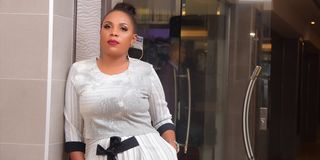Prime
How social capital boosted Ayebazibwe’s business

Racheal Ayebazibwehas used her social circles to boost her business. PHOTOs/nicolas akasula
What you need to know:
Rachael Ayebazibwe, who started out with a handful of items, has since expanded into selling men’s and women’s clothing and accessories such as bags, shoes, sunglasses, watches and jewellery.
Racheal Ayebazibwe is the proprietor of Ruby Delights, a boutique in Entebbe town. Her unconventional strategy of stocking her shop has saved her from making losses in form of deadstock. What started off as a necessity back when she did not have enough money to buy stock in bulk, has now become her business strategy.
After completing a bachelor’s degree in Environment and Disaster Management in 2005, Ayebazibwe worked as a sales executive with Crane Bank. “Getting clients was an uphill task. And retaining them was even tougher. When I could not take it anymore, I called it quits in 2016,” she says.
For the next eight months, Ayebazibwe tried to look for other jobs in vain. Eventually, she came up with an idea to sell men’s clothing, hair wigs and weaves. But without much capital, she relied on a friend based in the UK to buy for her only when a client deposited money for an item.
“I have an eye for stylish clothes. I know how to dress men in different age brackets and sizes. So, I started spending a lot of time online looking at what was trending and appropriate clothing for men in my social circles, to whom I hoped to sell,” says Ayebazibwe.
With her savings of Shs1m, Ayebazibwe asked her friend to buy for her a few T-shirts, shirts and hair pieces. It is at this point that her business idea came to life. “When I got some stock, I needed to look for customers. I started going to people’s offices with my clothes. I informed all my friends and family about my business. Everywhere I went, be it at a party or a friend’s place, I always carried clothes to sell in the car,” she recounts.
With time, people started to like her merchandise and it was all sold out in two weeks. “I was selling 16 inches of human hair pieces for Shs180,000, but they were all bought which gave me more capital to send for more merchandise,” Ayebazibwe says.
With her increasing clientele, Ayebazibwe felt it was time to expand her business. Using capital of Shs5m, she rented a shop in which she stocked 10 T-shirts, five men’s shirts, three handbags, two pairs of shoes, and seven hair pieces. “People ridiculed me whenever they walked into the shop and saw my insignificant stock. While I had paid rent for four months, my stock was not enough to attract clients to my shop,” she recalls.
Shortly after opening her shop, Ayebazibwe tied the knot. “But the most disturbing question on my mind was how I was going to stock my shop. I decided to go to Bangkok, Thailand for our honeymoon hoping to shoot two birds with one stone; have some quality time with my husband and do some shopping for the shop. Fortunately, my husband was receptive of the idea and he has been very supportive of my hustle since then,” she says.

Growing clientele
Research shows that most startups in Uganda hardly live to see their third birthday and this is one of the things Ayebazibwe did not want to witness. “I did not want my business to become another statistic. I did not want my business to fail. Each new day, I was thinking of ways of making it work,” she says.
With her marketing background, Ayebazibwe needed to grow her client base. She was frugal and she continued to send samples of what she had in stock to contacts. She also used her social media platforms to market her merchandise. She says she normally buys about two pieces in different sizes for her clients. Over time, she has also taken time to learn her clients’ tastes and preferences so she never has stock stuck on her shelves. Ruby Delights, which started off with just a handful of items has since expanded into selling men’s and women’s clothing and accessories such as bags, shoes, sunglasses, watches, jewelry and perfumes among others. “I was inspired to go into selling cosmetics because clients used to admire and compliment my skin. Some would even ask me to buy for them whatever I was using and sell it to them. This made me realise I had another avenue for making money,” she says. Her most popular cosmetics are lightening and anti-aging creams which she imports from USA.
Challenges
Ayebazibwe’s biggest challenge is debt recovery. “Clients take outfits but take ages to pay for them. In some cases they never pay and never come back,” she notes. Also people want good quality products but they are unwilling to pay what they cost.
Achievements
Ayebazibwe has since opened a second branch. From the stores, she is able to pay school fees for her children and take care of her family. She and her husband have bought a plot of land where they are planning to build their family home.




